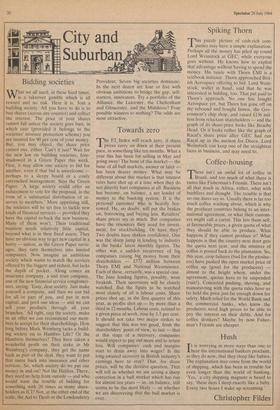City and Suburban
Bidding societies what we all need. in these hard times, is a takeover gamble which is all reward and no risk. Here it is. Join a building society. All you have to do is to buy shares (across any counter) and collect the interest. The price of your shares cannot fall unless the society goes bust, in which case (provided it belongs to the societies' investor protection scheme) you are insured for 90 per cent of your money. But, you may object, the share price cannot rise, either. Can't it just? Wait for the new law on building societies, fore- shadowed in a Green Paper this week. First, it may allow one society to bid for another, even if that bid is unwelcome perhaps to a sleepy board or a cosily entrenched management. Says the Green Paper: 'A large society could offer an inducement to vote for the proposal, in the form of a substantial distribution of re- serves to members.' More appetising still, the societies will be set free to tackle new kinds of financial services — provided they have the capital to.back the new business. Many of them won't. Their traditional business needs relatively little capital, beyond what is in their fixed assets. They have no obvious way to get new capital in a hurry — unless, as the Green Paper envis- ages, they turn themselves into limited companies. Now imagine an ambitious society which wants to match the services offered by the biggest and richest, but lacks the depth of pocket. Along comes an insurance company, a unit trust company, one of the new financial service conglomer- ates, saying: 'Easy, dear society. Just make yourself a company, and then we can bid for all or part of you, and put in new capital, and pool our ideas — and we can sell your products through all your branches.' All right, says the society, make us an offer we can recommend our mem- bers to accept for their shareholdings. How long before Mark Weinberg tacks a build- ing society on to Hambro Life? Or the Hambros themselves? They have taken a wonderful profit on their stake in Mr Weinberg's company, they get the name back as part of the deal, they want to put that name back into insurance and other services. So, which society do we put our money in and on? Not the Halifax. There, they need no help from outside — and who would want the trouble of bidding for something with 20 times as many share- holders as ICI? Not, at the other end of the scale, the Aid to Thrift or the Londonderry
Provident. Seven big societies dominate. In the next dozen are four or five with obvious ambitions to bridge the gap, self- starters, innovators. Try a portfolio of the Alliance, the Leicester, the Cheltenham and Gloucester, and the Midshires? Four possible winners to nothing? The odds are most attractive.










































 Previous page
Previous page